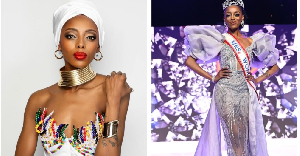By Ghana News
Copyright ghanamma

Tshego Gaelae recently became the first Black woman and the second-ever South African to win the title of Mrs World.
“It’s how you carry the crown, what you do with the crown and what kind of legacy you leave,” she told People, reflecting on her win. “I think it serves as a great reminder that each and every one of us is worthy and each and every one of us can.”
The groundbreaking pageant queen didn’t instantly comprehend just how much her win could mean, because it felt like “such a distant possibility” until the crown was actually on her head.
“It wasn’t really tangible in my view,” she added. “But having done so and having competed and having won, I feel like it’s just beyond. It’s bigger than just me. It’s not just about me. It’s about every other Black woman or mixed race woman or Indian woman or even White woman who has dared to dream.”
After being crowned in January this year, the 35-year-old Johannesburg resident’s life has changed completely. She defeated 39 other competitors, including Thailand’s Ploy Panperm, who came in second, and Sri Lanka’s Ishadi Amanda, who was the first runner-up.
Gaelae told People that she had no prior pageantry experience before winning Mrs. South Africa, the national competition that earned her a spot at the international level. Gaelae remembered how “testimonials” from past winners who had broader advantages from pageant training sparked interest.
“They spoke about how experts in specific fields would be brought in to help ladies and empower them on various topics like confidence boosting, public speaking, financial management, all of those aspects,” Gaelae explained. “I thought, ‘Wow, this is something I could really benefit from.’”
She was lured to the pageant world for the “networking opportunities” and “the opportunities to really be empowered,” she continued, given her expertise in corporate settings and as an attorney. Before she began training, Gaelae said she deliberately tried to put an end to her own stereotypes about pageantry.
“You’d hear the sentiments that people share about pageantry and stereotypes, saying pageantry women are catty. Women don’t want other women to succeed, women are mean to each other,” she told People. “I walked in as a blank canvas and I really told myself that it will be what it is. It will be what it is, and it will be what I make of it, because it’s also my responsibility to make it what I want it to be for me.”
Gaelae made use of her professional leadership abilities.
“I always say to people, ‘Make the experience your own. Don’t let my experience cloud your judgment of what it is,’” said Gaelae. “So I really allowed myself to be immersed in the [pageant] experience, to take it all in and not allow the misconceptions and people’s views and judgments cloud my view.”
Gaelae was glad to expand her comfort zone and meet new people, as she hoped, and the entire process certainly boosted her own self-confidence.
While the experience wasn’t all about winning for her, Gaelae went into the pageant knowing she could make history as the first Black winner. She and her mentor discussed the possibility—and its implications—thoroughly as they prepped for the event.
“She said, ‘Please just remember this is huge, because if you win — and should you win, and when you win — you will be the first Black woman to have won Mrs. World. So think about what you want that to mean to you and think about what you want that to mean to the world,’” Gaelae recalled her mentor’s words.
Carrying such a milestone win adds “pressure,” but it’s a weight Gaelae believes she was designed to bear.
According to the University of Johannesburg (UJ), she is committed to uplifting the next generation as a practicing lawyer, an advocate for education, and the founder of a non-profit organization. While the title represents an accomplishment, she stays committed to her basic mission of pushing for education, social impact, and breaking down barriers for women and young people.
She is committed to helping disadvantaged children by donating school shoes and uniforms through her nonprofit organization, We Are Our Children’s Keeper. According to her, no child should have to suffer to get access to educational possibilities; education should be a right, not a privilege.
She told UJ, “I want to be remembered for my authenticity, impact, and commitment to sustainable change. If a girl from Soweto can achieve her dreams, then so can you.”